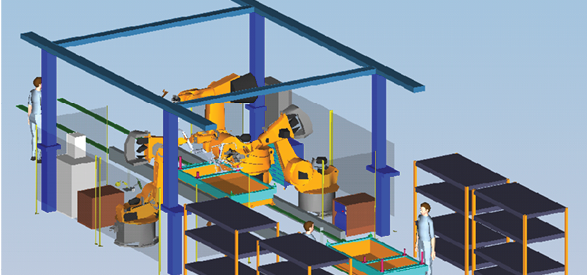1. Module description
In this course students learn how to assess and effectively use digital factory methods and tools.
The course deals with the following topics:
- IT support for work planning
- Areas of use, applications, and functionality of digital factory tools
- Methods and approaches to digital manufacturing process planning, modeling, and simulation to evaluate the manufacturability of products
Students gain the following specialist skills: Students learn about digital tools for work planning as well as how to use them in the following areas:
- Digital assembly planning and simulation, NC planning and simulation, robot planning and simulation, logistics planning and simulation, factory structure planning, and quality management
- They also learn to use product data management systems.
In addition, students learn to:
- Analyze and assess the manufacturability of products
- Assess and evaluate results of product process simulation
Technical skills: 55% | Methodological skills: 20% | Systems expertise: 20% | Social competences: 5%
2. Module components
| Course | Type | Credits | Course hours per week | C/E/CE |
|---|---|---|---|---|
| IT Solutions for Digital Factory | Lecture | 3 | 2 | C |
| IT Solutions for Digital Factory | Tutorial | 3 | 2 | C |
3. Content
During this course students learn how IT is used to support work planning; the areas of use, applications, and functionality of digital factory tools; as well as methods and approaches to digital manufacturing process planning, modeling, and simulation to evaluate the manufacturability of products. They thus gain the skills to understand and use digital tools for work planning and evaluate the manufacturability of products as well as related production processes. Students apply the knowledge acquired during lectures in an interdisciplinary, practical team project, where they design, plan, and construct a digital factory for virtual operation. The project gives students the opportunity to apply digital factory IT tools for modeling and simulating assembly processes, material flow simulation, building planning, tolerance simulation, and virtual commissioning, while also gaining experience with issues relevant to industry.
4. Learning objectives
This course teaches students how to assess and effectively use digital factory methods and tools as well as assess the manufacturability of products and implementation of processes.
5. Target group
Suitable degree programs:
- Mechanical Engineering, M.Sc.
- Production Engineering, M.Sc.
- Computational Engineering Sciences, M.Sc.
- Industrial Engineering and Management - Information and Communication Systems, M.Sc.
- Industrial Engineering and Management - Mechanical Engineering, M.Sc.
6. Prerequisites
Prerequisites:
Mandatory prerequisites: none
Preferred prerequisites:
- Knowledge of technologies of virtual product development or basic principles/applications of industrial information technology
- Knowledge of production engineering and work planning
7. Lecture day and time
When:
Wednesday, 14 - 16:00
Start: 20.04.2023
Room:
PTZ 507 or online via Twitch (see Quick links)
Course materials:
All course materials are provided in ISIS (see Quick links above).
8. Tutorial:
The tutorial is conducted as a project. At the beginning of the semester, students complete practical exercises over two weeks, learning how to apply methodology and use software. This is followed by a project kick-off, where teams of 4-8 are assigned a task. Project results are presented in two design reviews. The course concludes with a final presentation at the end of the semester.
When:
See course description in ISIS
Where:
VELC PTZ 514 / online

